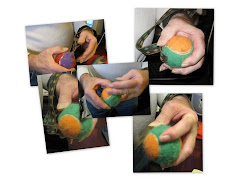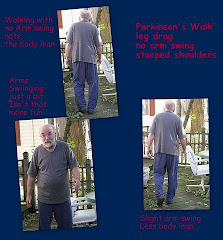The news for US Parkinson's Disease patients waiting for an early FDA clearance of the Neurpro patch formulation is not good. On April 23, 2010 UCB announced the receipt of the FDA response letter. The FDA informed UCB Pharma that it will have to resolve all crystallization issues with the Neupro® patch. Apparently the policy is zero tolerance despite the fact that the patch was returned to the European market about 10 months ago.
We already knew that if the patch received approval (again) from the FDA that there would be a delay while the new patches were produced. In all likelihood, the news would not have been officially released until the patches were on their way throughout the US to pharmacies for cold storage. This delay would have put the availability back to the end of 2010.
From the 4/23/10 announcement: "We have already been working on a room-temperature stable, improved formulation of Neupro® and have made significant progress in this area," the Chief Medical Officer of UCB added. "Neupro® has made a meaningful difference for many people with Parkinson's disease and Restless Legs Syndrome. We are committed to obtaining FDA approval so that people in the U.S. who live with these diseases can benefit from Neupro."
The good news for PD patients around the world with the exception of the USA are the results of the RECOVER study were presented in at the American Academy of Neurology annual meeting in Toronto, Canada in April, 2010. The data demonstrated the rotigotine improved both early morning motor function and improved non-motor symptoms in Parkinson's patients. Symptoms such as sleep, mood, cognition and pain were measured and found to be improved. Nocturia, night time excessive urination remained unchanged and there were some adverse events such as site reactions, nausea and dizziness in both the rotigotine group and the placebo group. Rotigotine was shown to be effective up to 6 years and provided improvement in movement symptoms for up to 6 years.
In another study the Neupro® Rotigotine Transdermal Patch was shown to provide sustained benefit for Restless Leg Syndrome.
One thing to remember is that rotigotine is a dopamine agonist and as such there are also side effects. It is unlikely that reformulation will alter those side effects because of the class of the medication. For the people who have been helped by this medication, its loss was quality of life altering.
We wonder why the the FDA did not allow for a provisional approval for, say 2-3 years, while UCB worked to meet the present requirements. Based upon the fact that the medication is on most of the world market already, it would be the humane thing to do.
Addendum: On April 3, 2012 UCB announced that the FDA has approved the revised patch. UCB has targeted July 2012 as for the return to the US market.















I was diagnosed withj PD 8 months ago and live in the UK. My neurologist prescribed Neopro Patches and I have found them very beneficial except that my skin is affected by a redness where the patch has been placed. However this is to me diminimus and I am perfectly happy with them tonyangler@aol.com. 1 June 2010
ReplyDeleteAccording to what we have read, the best way for patch users to avoid skin irritation is to avoid putting it in the same place with every application. Altering the location may not stop a mild reaction but it will enable tolerablity.
ReplyDeleteMr W, we're glad to hear that Neupro is helping.
Thank you for the article. I cant believe the FDA would take this med of the market when so many people need it, and not allow it to be sold in the US. The worst part is that this medication actually HELPS people with the symptoms! Worst of we have been shipping Neupro to our customers for quite some time now without a single complaint about the quality of the product!
ReplyDeleteBut there is some good news in all this for those who want to take neupro.
ibenefitRx.com is a Canadian pharmacy that supplies Neupro from our UK affiliate and ship it to US customers on a regular basis.
For those in the US wanting to get a supply of neupro we can definatly help you with that. We DO require a LEGAL prescription from your doctor, so please DO NOT come asking for ANY drugs without one.
Many buy 3 month supplies to reduce shipping costs, but we sell in 1 and 2 months as well and have a 100% delivery guarantee.
Visit us at http://www.ibenefitRx.com or call 877-807-1809.
Finally we would like to thank parkinsonsfocustoday for providing such vital information about neupro, and other Parkinson related news.
(Direct Link to Neupro Product)
http://www.ibenefitRx.com/Medication/Neupro/
My wife was diagnosed with PD in 2005. Initially she was prescribed with Madopar, and later with Stalevo. These medicines could not control false and requent urination signals and tremors of the body. A week ago she started to take transdermal patches (daily), apart from Stalevo and Madopar. I can say with confidence that she now feels 60% better.
ReplyDeleteCheers
Sammy
Sydney, Australia.
Sam, thanks for including us in your loop. You can't argue with 60%, that's real progress.
ReplyDeleteWe need to hear this type of report.
Is this drug the same as a fentanyl patch? My father has had PD since the age of 42 and is now 72 and has this patch, but I was not sure if you are talking about the same thing!! He has it for pain relief.
ReplyDeleteThe Neupro rotigotine patch is not the same thing as the Fentanyl patch.
ReplyDeleteThey are not that chemically similar. Rotigotine is C19H25NOS where Fentanyl is C22H28N2O. Both are metabolized through the liver.
Fentanyl is a synthetic narcotic pain killer which acts rapidly but has a short period of effectiveness before wearing off. Fentanyl acts on the mu-opioid receptors which is why derivatives were used to make designer opiod drugs back in the day.
Rotigotine is a non-ergot derived dopamine agonist. The advantage of the patch is the steady low dose delivery in order to eliminate "off times" throughout a 24 hour period.
Because your father has a patch, he probably runs less risk of bradykinesia and rigidity which can result in a person with PD on Fentanyl in particular when it is used as an anesthetic.